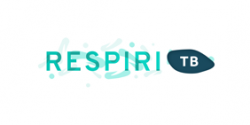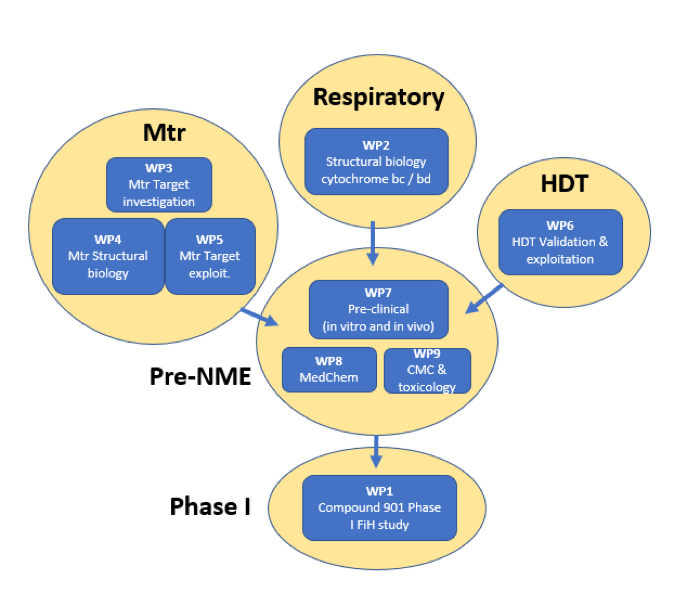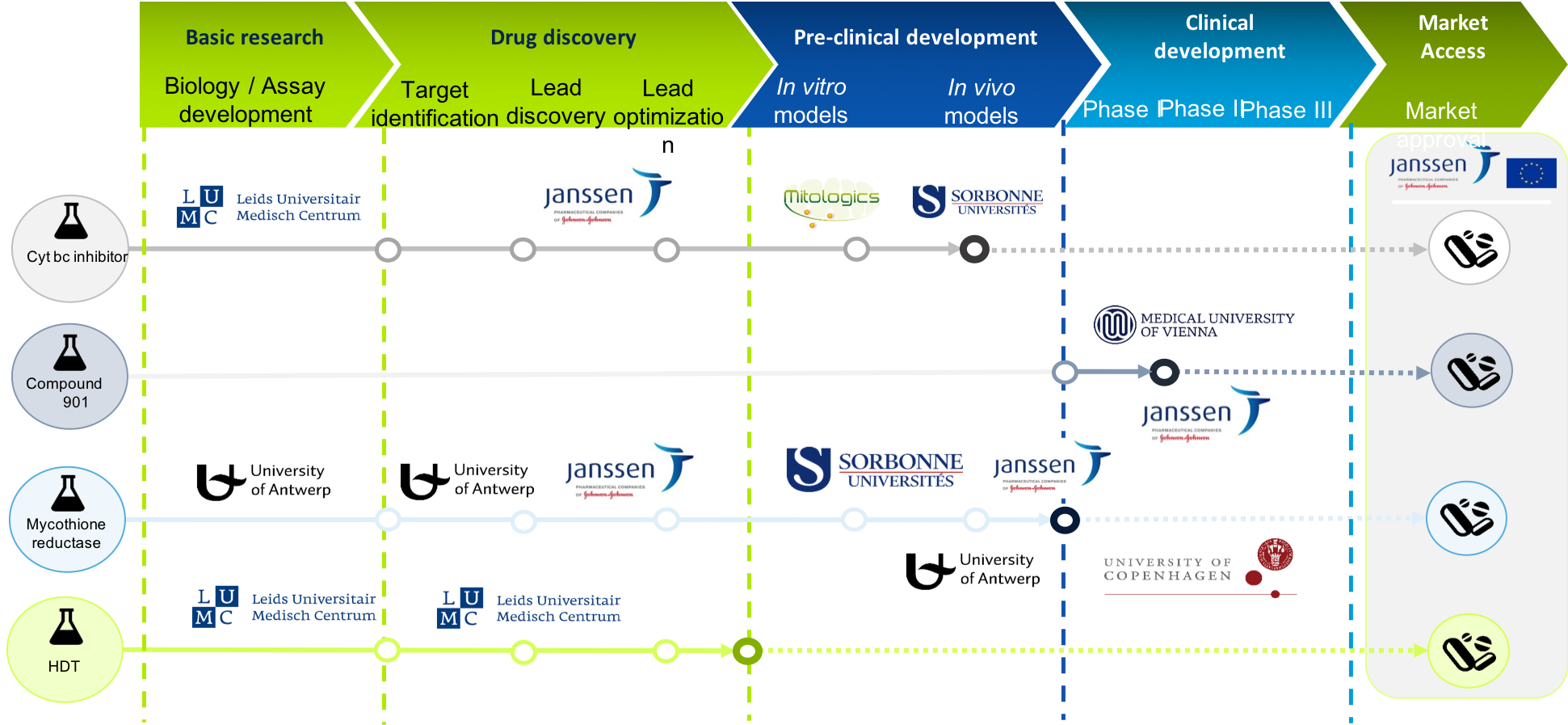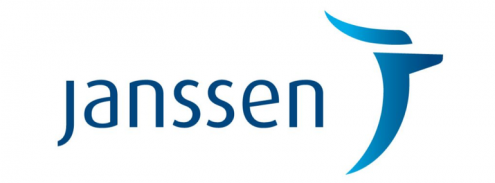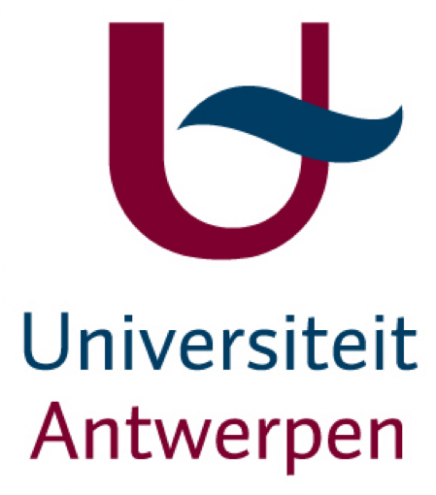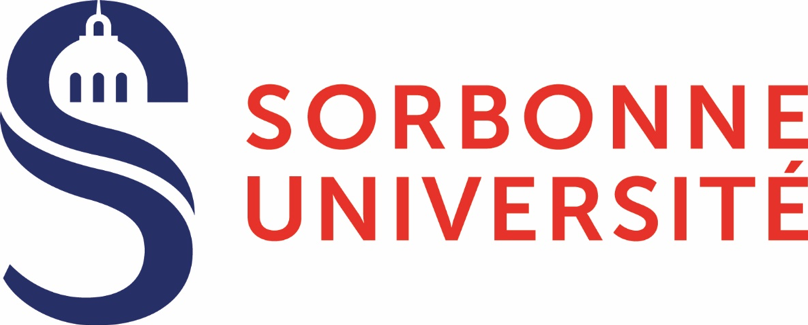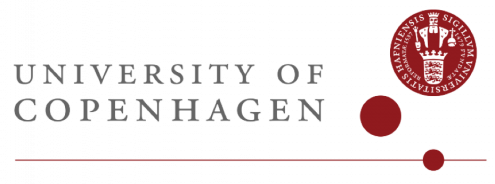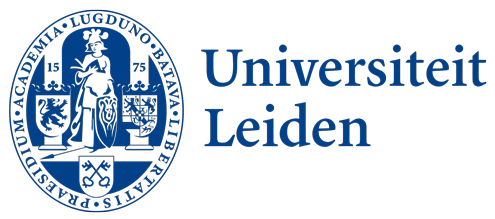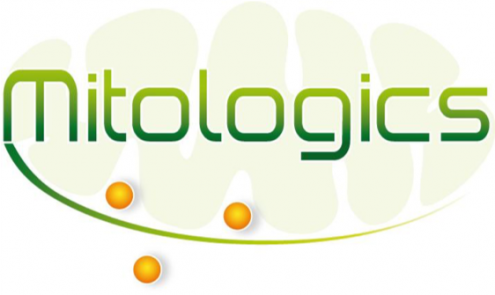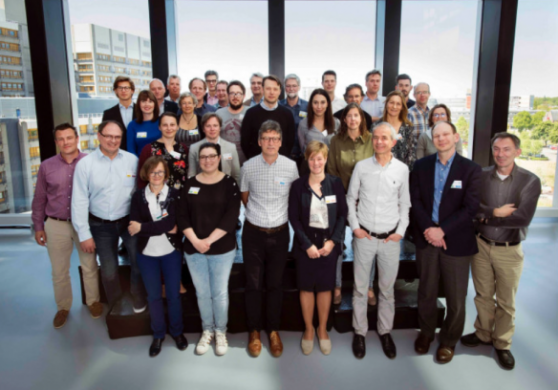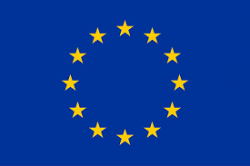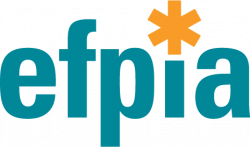Follow us:
Mission and Vision
In 2018, there were approximately half a million new cases of drug-resistant tuberculosis (TB); most of these (78%) were multidrug-resistant (MDR), meaning they are resistant to at least two of the most effective, front line antibiotics used to treat TB. MDR-TB has historically been extremely difficult to treat; a full course of antibiotics can last up to two years, and trigger unpleasant side effects. New medicines introduced in recent years have begun to make a major difference for patients; however, even more innovation is needed to curb the TB epidemic. In 2018, a group of international industry, research, academic and strategy organisation came together to form a new, first-of-its-kind collaboration – called RespiriTB – aimed at advancing the development of new drug candidates that could be part of a new, more effective, shorter regimen to treat MDR-TB.
The team at RespiriTB is particularly focused on compounds that interfere with the TB bacterial energy metabolism. The project will carry out a range of studies on the drug candidates selected, including initial clinical studies in humans. Ultimately, the project hopes to contribute to the development of a new, more efficient combination drug regimen for MDR-TB, with a shorter treatment duration and a lower risk of future drug resistance.
Strategy
The RespiriTB projects aims to develop novel antibiotics that target the Mtb respiratory pathway, the energy centre of the bacterium. Treatment will be combined with the recently developed antibiotic bedaquiline, developed by the Janssen Pharmaceutical Companies of Johnson & Johnson, that also targets the Mtb respiratory pathway, thus creating a double blow to the bacterium. RespiriTB will also cast a wider net in search for novel antibiotics, by targeting other essential Mtb proteins. In addition, the project will target human factors that are needed for Mtb to survive in the infected host. Our development of novel treatment regimens with shorter treatment time and that are less prone to drug resistance will be an essential factor in the fight against TB, the world’s deadliest infectious disease.
The RespiriTB and RespiriNTM consortium is closely linked to other initiatives under the larger AntiMicrobial Resistance (AMR) Accelerator and will collaborate to establish the longer-term aim of finding more efficient and effective treatments for TB through shortening of treatment and reducing the occurrence of drug resistance. Both top health priorities set forth in the Strategic Research Agenda of the IMI2 Joint Undertaking.
Governance
Publications
- Kilinç, G., Saris, A., Ottenhoff, T., Haks, M. C. (2021) Host-directed therapy to combat mycobacterial infections, Wiley Online Library, Immunological Reviews, DOI: 10.1111/imr.12951
Project consortium
About Janssen Pharmaceutica
At Janssen, we’re creating a future where disease is a thing of the past. We’re the Pharmaceutical Companies of Johnson & Johnson, working tirelessly to make that future a reality for patients everywhere by fighting sickness with science, improving access with ingenuity, and healing hopelessness with heart. We focus on areas of medicine where we can make the biggest difference: Cardiovascular & Metabolism, Immunology, Infectious Diseases & Vaccines, Neuroscience, Oncology, and Pulmonary Hypertension. We have a longstanding commitment to develop and responsibly deploy innovative technologies and treatments to combat the growing threat of antimicrobial resistance (AMR) on multiple fronts. Follow us at @JanssenGlobal.
Contact:
Alex Pym (Project Leader) – apym@its.jnj.com
About Leiden University Medical Center (LUMC)
LUMC is a university medical center for research, education and patient care with a high-quality profile and a strong scientific orientation. It has a unique research practice, ranging from pure fundamental medical research to applied clinical research. Researchers at LUMC work together around 7 medical research profiles: Vascular and Regenerative Medicine; Immunity, Infection and Tolerance; Translational Neuroscience; Cancer Pathogenesis and Therapy; Ageing; Innovation in Health Strategy and Quality of Care; and Biomedical Imaging. LUMC is a center for medical innovation, committed to the advancement of health care and education in line with the latest international insights and standards – and aims to play a nationally and internationally recognized leading role in improving medicine and the quality of health care.
Contact:
Meindert Lamers (Project Coordinator) – m.h.lamers@lumc.nl
Tom Ottenhoff – T.H.M.Ottenhoff@lumc.nl
Marielle Haks – M.C.Haks@lumc.nl
About University of Antwerp
The University of Antwerp (UAntwerpen) is a fully accredited Belgian University with high standards of research and education. UAntwerpen is ranked 14th in the World, 7th in Europe among the “young” universities (less than 50 years of age) and 210th among all universities according to QS World University Rankings 2018. Although UAntwerpen is a mid-size university in Belgium, the CWTS Leiden Ranking in Natural Sciences ranks UAntwerpen 1st in Belgium in collaborative publications and 3rd in the category impact. The Uantwerpen is represented by 3 groups (LMPH, ORSY and UAMC) in RespiriTB and 2 groups (ORSY and UAMC) in RespiriNTM projects.
Contact:
LMPH: Paul Cos – paul.cos@uantwerpen.be
Davie Cappoen: davie.cappoen@uantwerpen.be
UAMC: Koen Augustyns –koen.augustyns@uantwerpen.be
ORSY: Bert Maes –bert.maes@uantwerpen.be
About Sorbonne University
Sorbonne Université hence becomes a fully multidisciplinary research-intensive university with three faculties: Humanities and Social Sciences, Medicine and Sciences & Engineering. With more than 53 400 students (among 10 200 international students), 4400 doctoral students and 6300 researchers, Sorbonne Universitéis a leading French university. It assists the researchers for all the administrative, financial and legal aspects of the research projects. In particular, the research officers ensure a follow up of the project results and their adequate exploitation and technology transfer.
The Sorbonne group is leading by Dr. Vincent Jarlier & Dr. Nicolas Veziris and Dr. Alexandra Aubry. The group brings to the consortium a large medical and biological expertise on mycobacteriology, including M. tuberculosis and non-tuberculous mycobacteria (NTM) of medical importance, as well as the vision of therapeutic applications. The team focuses mainly its activity on therapeutic aspects of tuberculosis and NTM infections: (a) study of new drugs, based on microbiological technics, molecular biology, biochemistry and structural biology; (b) in vivo activity and efficiency of new therapeutic regimens using various mouse models; (c) mechanisms of resistance in clinical strains and in vitro selected mutants, based on microbiological technics, molecular biology (sequencing, WGS…) and biochemistry.
https://www.sorbonne-universite.fr
Contact:
Alexandra Aubry – alexandra.aubry@sorbonne-universite.fr
Nicolas Veziris – nicolas.veziris@sorbonne-universite.fr
About MedUni Vienna
The Medical University of Vienna (briefly: MedUni Vienna) is one of the most traditional medical training and research facilities in Europe. With its 26 university hospitals, three clinical institutes, 12 theoretical medicine centres and numerous highly specialised laboratories, it is included among the most important cutting-edge research institutes of Europe in the area of biomedicine. The role of MUW in the programme will be to plan, perform and analyse clinical first in man studies in healthy subjects and studies in specific patient populations with all compounds developed by the consortium. The clinical assessment will cover safety and tolerability. After biochemical quantification of the pharmacokinetic samples in a certified laboratory, pharmacokinetic analysis will be performed to optimize preclinical models as well as PK/PD modelling in other work packages.
The Department of Clinical Pharmacology of the Medical University of Vienna is an academic institution which aims at providing expertise and special infrastructure on preclinical and clinical drug development with the ultimate goal to develop and evaluate innovative therapeutic interventions and diagnostic technologies. The department performs 30 phase 1 studies per year including several FIM studies. During the RespiriTB/NTM projects, the Department of Clinical Pharmacology of the Medical University will be represented by Prof. Markus Zeitlinger.
https://www.meduniwien.ac.at/web
Contact:
Markus Zeitlinger – markus.zeitlinger@meduniwien.ac.at
About University of Copenhagen
University of Copenhagen is the largest and oldest university in Denmark and one of the oldest researches and teaching institutions in Northern Europe. The 38.000 students and 9.700 employees (of which more than 5000 are researchers) work on four large campus areas in Copenhagen. The University consists of 6 faculties consisting of 36 departments and more than 200 research centers. The University of Copenhagen is ranked as #22 in Europe and #73 in the world, according to QS World University Rankings 2017.
UCPH group directed by Dr. Anette Müllertz and Prof. Thomas Rades will be responsible for the physico-chemical characterization of the lead compounds identified by the other partners and Jansen. This will include solubility and supersaturation propensity of the lead compounds. Based on the outcome, a formulation strategy will be formed. Drug delivery systems will be developed using physiological relevant in vitro models simulating the GI tract. Both lipid-based and amorphous delivery approaches will be considered for developing the most suitable formulation for increasing the bioavailability. Selected drug delivery systems will be tested for their pharmaco-kinetic profile in small animal models.
Contact:
Annette Müllertz – anette.mullertz@sund.ku.dk
Thomas Rades – thomas.rades@sund.ku.dk
About University Leiden
Leiden University was founded in 1575 and is one of Europe’s leading international research universities. It has seven faculties in the arts, humanities and sciences, spread over locations in Leiden and The Hague. The University has over 6,700 staff members and 28,130 students. Much of our research focuses on making the unknown known and extending the boundaries of existing fields of research. Our research has a strong disciplinary basis within a very broad range of scientific fields. The university has thirty research institutes, located in both Leiden and The Hague, each of which conducts disciplinary and interdisciplinary research. Our researchers maintain close contacts with one another other and with society across the boundaries of their institutes and faculties. They are guided by the highest ambitions of quality and integrity.
Leiden group leader, Prof. Herman P. Spaink is the experts in the use of cell biology and systems biology and pharmacology to test efficacy and pharmacokinetic properties of drugs against infectious disease. For this we use as well high throughput experimental approaches as theory development to translate data from different test systems. A major focus has been on testing antibiotics in tuberculosis disease models, with a main emphasis of the responses of the pathogens inside the host immune cells. This is highly relevant since pathogens have a very different response to drugs when they are inside the host as compared to the free-living state. One of our major systems models for tuberculosis progression is the use of zebrafish larvae for high throughput screening.
https://www.universiteitleiden.nl
Contact:
Herman Spaink – h.p.spaink@biology.leidenuniv.nl
About Mitologics
Mitologics SAS is an innovative French biotechnology company (SME) founded in 2009 by Dr. Annie Borgne-Sanchez, Dr. Nelly Buronand Mathieu Porceddu. The company is specialized in the detection of mitochondrial alterations for applications in toxicology and pharmacology. The team has a strong expertise in cell and mitochondrial biology, metabolism, apoptosis and cancer. The company won the “Concours national d’aideà la creation d’entreprisesde technologies innovantes” in 2009 and 2011, awarded by the French Ministry of Education and Research. Mitologics is member of the “Pôlede CompétitivitéMEDICEN Paris-Région” and of the French association of R&D service providers participating to innovative research programs in Life Sciences (AFSSI).
Mitologics directed by Dr. Annie Borgne-Sanchez will evaluate compounds provided by partners of the consortium for their mitochondrial toxicity risks on its screening platform (MiToxView®). Both acute and long-term mitochondrial toxicity will be studied on isolated rodent mitochondria (first stage screening) and hepatic differentiated cells (on optimized compounds). Mitologics has published several papers validating its screening assays to detect drug-induced mitochondrial damages and performed several studies for pharmaceutical and cosmetic industry.
Contact:
Annie Borgne-Sanchez – aborgne.sanchez@mitologics.com
About FFUND BV
FFUND is a young and ambitious Dutch SME that provides full-service consultancy in project management, assistance in development of exploitation strategies, active communication, dissemination and promotion activities, based on years of experience. We combine scientific expertise and in-depth knowledge of project management with translational science and life science entrepreneurship. FFUND is able to identify exploitable research results, and support scientist in defining the optimal strategy for valorisation. Moreover, FFUND is expert at securing the right (non-) dilutive funding for R&D projects.
During the RespiriTB/NTM projects, FFUND’s PRINCE qualified project manager, Dr. Mima Malcicka, will aid in management and developing dissemination strategies. Moreover, FFUND plans for success continuation of the technology by securing follow-up funding throughout the complete value chain from the early start, through controlled growth, until a successful exit. FFUND will ask the tough questions to clear up any ambiguities and spot the innovative strengths, ultimately leading successful commercialization of the RESPIRI-TB results.
Contact:
Ilina Bareja – ilina.bareja@ffund.nl
| This project has received funding from the Innovative Medicines Initiative 2 Joint Undertaking under Grant Agreement No 853903. This Joint Undertaking receives support from the European Union’s Horizon 2020 research and innovation programme and EFPIA companies’ in kind contribution. https://www.imi.europa.eu/ |

